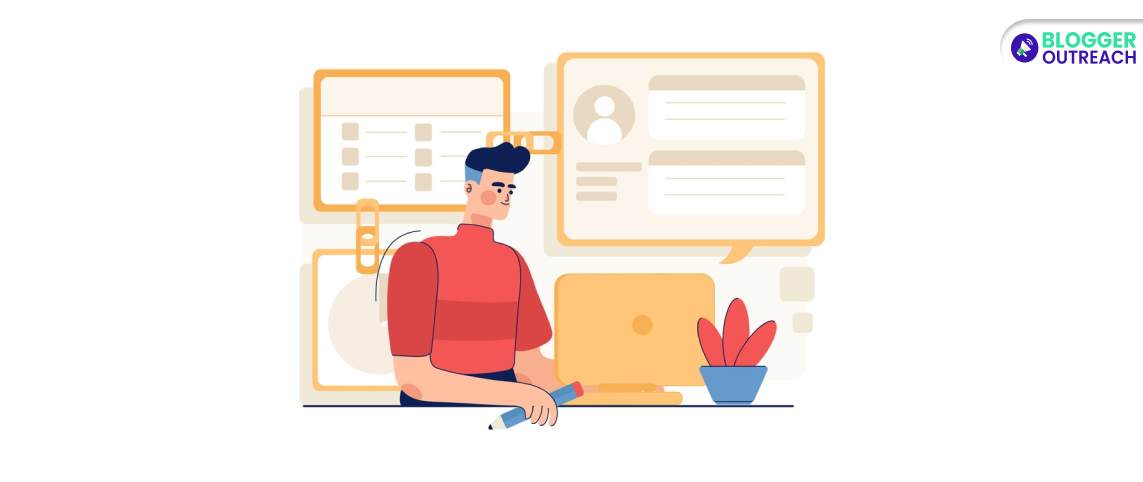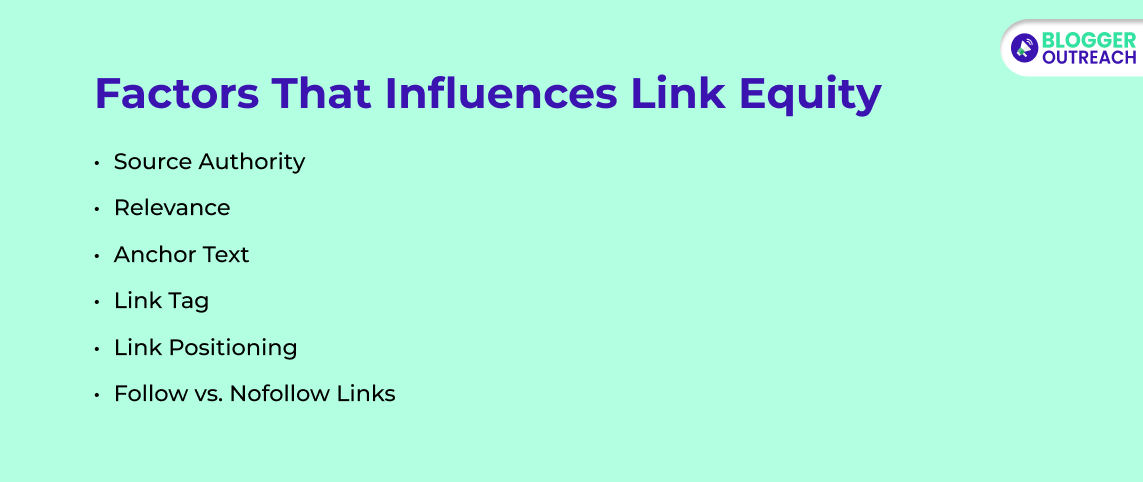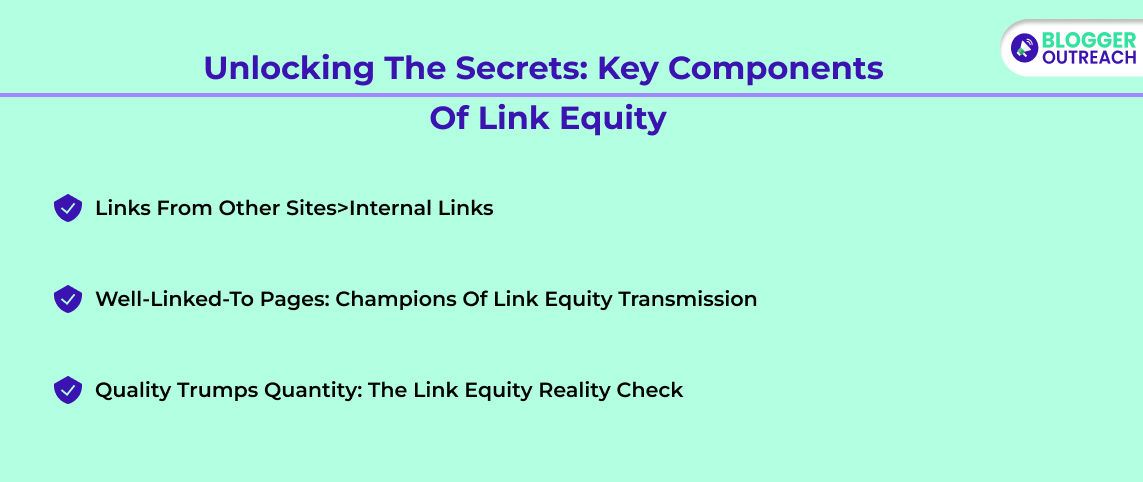Table Of Content
3 out of 4 SEOs vouch for link building to boost their online visibility. But not all links are worth your attention.
Many people try to manipulate the search results with spammy link building tactics and get penalized.
In fact, the search giant has categorically expressed that link quality is far more important than link quality.
So, how can you evaluate the quality of a backlink? Introducing, link equity, also known as link juice. In simple terms, it is the value of a link. The higher the link equity, more the SEO benefits you receive.
So, as a link builder, your goal is to build links that pass link equity and this content piece is all about that.
Here You Will Learn About:
- Link juice.
- How is it related to PageRank?
- What affects link equity.
- Its significance.
- The fundamental aspects of link equity.
- How to optimize your internal structure to get the most out of your link equity.
Let’s start…
What Is Link Equity?

Link equity, also known as “link juice,” is an SEO concept that refers to the value or authority passed from one page or site to another through hyperlinks.
Basically, when one page links to another, it essentially transfers a certain amount of its authority and relevance to the linked page. This can influence the linked page’s search engine ranking and visibility in search results.
The idea behind link equity is that search engines see links as votes of trust. If a reputable and authoritative website links to another site, it endorses its content. As a result, the linked page may experience improvements in its search engine rankings.
The Correlation Between Link Equity And PageRank
Understanding link equity and PageRank is crucial for understanding how links affect a website’s authority and ranking.
But, before that let’s understand what is PageRank:
PageRank is a foundational algorithm developed by Google’s co-founders, Larry Page and Sergey Brin. It measures how important a page depends on the number and quality of links it gets.
Moreover, it assigns a numerical value (PageRank score) to web pages based on the quantity and quality of links pointing to them.
Link Equity Plays A Pivotal Role In The PageRank Algorithm
The algorithm views links as votes of trust, and the more high-quality links a page receives, the higher its PageRank score is likely to be.
Links act as conduits for passing this authority from one page to another, contributing to the linked page’s PageRank.
In fact, Webmasters and SEO professionals often use PageRank as a metric to evaluate the link equity of a page. Higher PageRank scores indicate stronger authority, reflecting positively on a page’s potential search engine ranking.
We know that many of you think PageRank doesn’t work. According to Ahref, Google still uses PageRank to evaluate the number and quality of links. Hence, Link equity depends on PageRank.

So, the correlation between link equity and PageRank underscores the importance of high-quality, relevant links in SEO.
Hence, understanding and leveraging this relationship can contribute significantly to a website’s authority, ranking, and visibility.
Factors That Influence Link Equity

There are several factors that can affect the amount of link juice passed from one page to another:
- Source Authority: The authority of the linking page/domain matters. Links from highly authoritative websites are generally more valuable.
- Relevance: The relevance of the content on the linking page to the linked page is important. If the content is related, the link tends to carry more weight.
- Anchor Text: The text used in the hyperlink (anchor text) plays a role in determining the relevance of the link. Descriptive and relevant anchor text can provide additional context to search engines.
- Link Tag: Nofollow and Sponsored links do not pass any authority. So, no matter in what numbers you are getting them, these links will not pass any link equity.
- Link Positioning: In-content links (especially editorial links) get the most weightage. Whereas, links pointed from sidebars, footers, and authored bio are not that effective.
- Follow vs. Nofollow Links: Some links have a “nofollow” attribute, which tells search engines not to pass link equity. In contrast, “follow” or “dofollow” links do pass link equity.
Link Equity: Why Is It So Important?
An integral part of SEO is managing and optimizing link equity. Backlinks from authoritative sources can boost a website’s search engine visibility and ranking.
However, your link building practices should focus on quality rather than quantity. This is because search engines increasingly prioritize natural and organic link profiles. Unnatural or manipulative link-building tactics can lead to penalties from search engines.
Now, let’s explore the benefits that come with link equity:
1. Search Engine Ranking Signals
Search engines use algorithms to determine the relevance and authority of web pages. Link equity is a crucial ranking signal. In fact, it influences how search engines perceive the importance and credibility of a page.
2. Authority Transfer
Link equity represents a form of online endorsement or vote of confidence. When a reputable site links to another, it passes a portion of its authority. In turn, the linked page gains trust in the eyes of search engines.
3. Improved Search Visibility
Pages with higher link equity are more likely to rank higher in search engine results. Improved visibility can lead to increased organic traffic and exposure to a broader audience.
4. Enhanced Crawling And Indexing
Search engine crawlers use links to discover and index new pages on the web. Pages with more link equity are often crawled and indexed more frequently. This ensures their timely inclusion in search engine databases.
5. Long-Term SEO Benefits
Building sustainable link equity is a long-term investment in a website’s SEO performance. It provides a foundation for enduring search engine visibility and rankings over time.
6. Competitive Advantage
Websites with strong link equity often outperform competitors in search engine results. Actively managing and building link equity can give a website a competitive edge in its industry or niche.
7. Adaptation To Algorithm Changes
Search engine algorithms evolve, but link equity remains a fundamental element. Websites with a solid foundation of link equity are better equipped to adapt to algorithmic changes and maintain their search engine presence.
In essence, link equity influences search engine rankings, user trust, and website visibility online. Strategic link building is, therefore, crucial for businesses and individuals looking to succeed online.
Unlocking The Secrets: Key Components Of Link Equity

What are the pillars of link equity? When it comes to link equity, here are some things to keep in mind.
Let’s unravel the mystery by exploring the key components of link equity.
1. Links From Other Sites>Internal Links
When it comes to link equity, external links, those originating from other websites, reign supreme. They provide a long-term boost to your ranking value, surpassing the impact of internal links (those from within your website). While internal links are essential, especially if your domain boasts high authority. But the real game-changer lies in securing link equity from external sources.
Insider Tip: Focus on building a solid external link foundation, even if your domain is not yet a household name. Google values the diversity and credibility external links bring to the table.
2. Well-Linked-To Pages: Champions Of Link Equity Transmission
Imagine link equity as a baton in a relay race. Well-linked-to pages, whether internal or external, hold the baton with a firm grip. These pages, especially those with robust link profiles from high-value sources. Especially, they pass on link equity more effectively than their poorly-linked-to counterparts. It’s not just about quantity but the quality of the links that matter.
Insider Tip: Boost your page’s link equity transmission by cultivating a strong link profile. Seek links from influential and pertinent pages within your niche.
3. Quality Trumps Quantity: The Link Equity Reality Check
In the world of link equity, quality reigns supreme over quantity. Forget the notion that more links equal better rankings. Instead, focus on the intrinsic value each link brings.
A handful of high-quality, relevant links will outshine a sea of irrelevant ones. Link equity demands a discerning eye for linking only to the most significant and valuable content.
Insider Tip: Be selective in your linking strategy. Prioritize links that genuinely contribute to your content’s value and relevance.
How To Optimize Your Link Equity Distribution?
Imagine you have put your heart and soul into building high quality links with link equity …but somehow your internal; structure is preventing you from getting the utmost benefit. So, how to deal with this?
Let’s explore three practical strategies to capture missed opportunities and enhance your website’s link equity.
1. Redirect Old URL Paths: Unleashing Dormant Link Equity
Ever wondered about the abandoned trails of discontinued product pages or outdated website versions? These forgotten URLs hold untapped link equity potential. Redirecting these old paths can be a game-changer.
To surface these hidden gems, utilize tools like Screaming Frog and Ahrefs. Combine insights from Google Analytics and Search Console to compile a comprehensive list of potential broken URLs. Prioritize redirection based on linking root domains, unleashing a surge of link equity.
Pro Tip: MergeWords and the OpenList Chrome extension streamline the process for efficient redirection.
2. Analyze The .htaccess File: Mastering Global Redirects
Delve into the heart of your website’s link equity distribution – the .htaccess file. This powerhouse dictates global redirect rules. Identify patterns such as HTTP to HTTPS, non-WWW to WWW, or trailing slash rules.
Common pitfalls like 302 redirects where 301 is warranted can disrupt link equity flow. Scrutinize the .htaccess file for misconfigurations and collaborate with developers to rectify issues. Taking control of these directives optimizes the distribution at the foundational level.
3. Fix Internal 301 Redirects: Streamlining Link Equity Flow
Once external link equity is harnessed, ensure seamless internal distribution. Examine internal 301 redirects using Screaming Frog’s “Spider Mode.” Prioritize fixes by sorting redirects based on inlinks.
Key areas like primary/secondary navigation or sidebar links often harbour internal redirects. A strategic tweak in these zones eliminates numerous internal 301 redirects, guaranteeing maximum link equity transfer within your website.
Expert Insight: While Google claims no link equity loss in 3xx redirects, why leave it to chance? Ensure your internal links pass their full value throughout your site.
And That’s A Wrap!
We hope that by now it is clear that link equity and ranking go hand-in-hand.
After many years of experience as a link building expert, We can tell you with confidence that STRATEGY is the 1 thing that separates those who get authoritative links from those who don’t.
But now the strategy is not only content, building meaningful relationships with authoritative publishers results in high quality links.
So, try to build a long-term relationship with the publishers.
Wait We would like to give you some extra help.
Please Pick Below Which Area You Need More Help:
1. I don’t know why I don’t get responses for my emails.
2. How to get links from those high DA, and DR sites? I don’t know where to start with the link building campaign?
3. How do you write content that publishers will love to link to?
Once you pick your problem, write to us.
Read Also:






